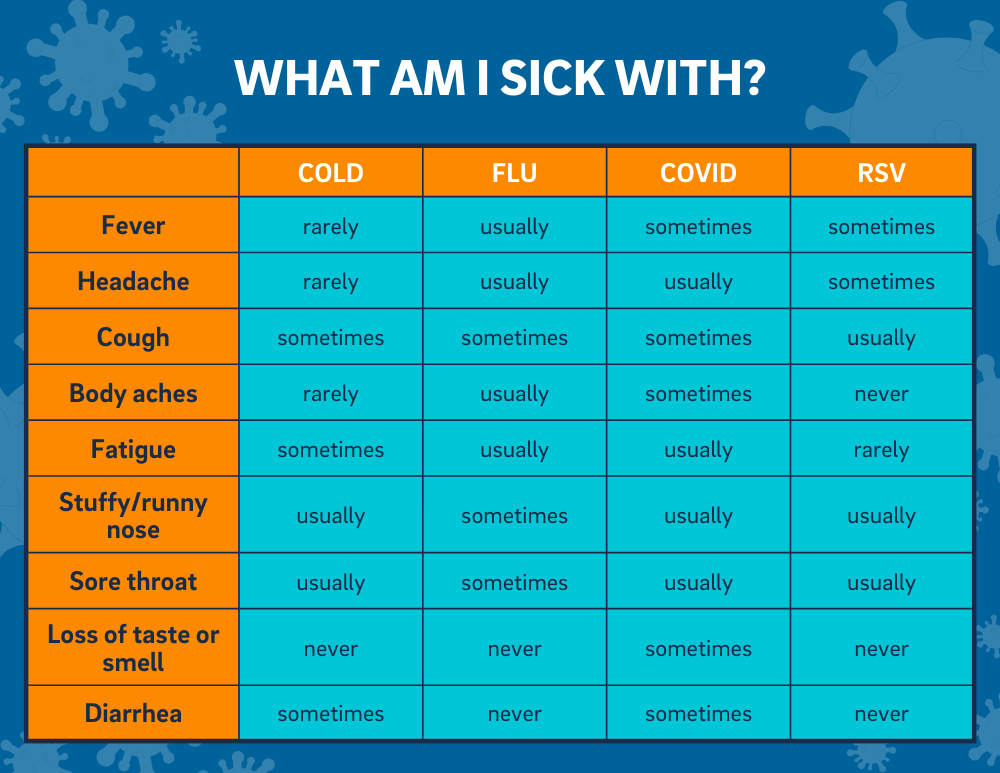The Common Cold
A cold is a viral upper respiratory infection that affects the nose, throat, and sinuses. There are over 200 types of respiratory viruses that cause the common cold. Colds are contagious and spread easily within homes, classrooms, and workplaces. On average, adults catch 2-3 colds per year. There is no cure for a cold but the symptoms usually only last 7-10 days and resolve on their own.
Symptoms
Cold symptoms often appear in stages. Within 1-3 days of catching a cold, a tickly or sore throat may appear as well as sneezing, runny nose, stuffy nose (nasal congestion), or cough. During days 4-7, the initial symptoms may worsen or peak, but mild body aches, headache, or fatigue may also develop. Colds are usually winding down in days 8-10 and most symptoms have resolved or are improving.

What’s the Difference Between the Flu and a Cold?
It can be difficult to tell the difference between a cold or the flu since many of the symptoms are the same, but they are caused by different viruses. The flu is caused by an influenza virus specifically, while many other types of viruses cause colds. One major difference is that the flu usually causes fever and chills, but adults don’t typically get a fever with a cold. The flu also causes body aches and more severe symptoms than a cold.
Avoiding the Common Cold
Colds are spread by close contact with infected droplets. These droplets can enter the body by being breathed in, or via a hand that touches the eyes, nose, or mouth after touching infected secretions or a contaminated surface.
Reduce the chance of getting a cold by doing frequent handwashing, avoiding touching the face, and cleaning frequently used surfaces. Getting adequate sleep and exercise, eating healthy meals, reducing stress, and staying hydrated can also help prevent a cold. It is also important to stay away from others who are sick or wear a mask if necessary.
Self-Care
Colds have no cure, but symptoms should improve on their own. Antibiotics don’t work against viruses and won’t relieve cold symptoms. Self-care recommendations are aimed at symptom relief and immune system support.
Self-care includes:
- Get plenty of rest
- Drink plenty of fluids (avoid milk/dairy products)
- Avoid smoking/vaping
- For sore throat, gargle with warm, salty water every 4-6 hours (mix ½ teaspoon of salt or baking soda in 8 ounces of warm water). Throat lozenges can also be used.
- For nasal congestion, nasal saline rinses can be used 2-3 times per day to clear the nose. If using over-the-counter medicated nasal spray, usage should be limited to no more than 3 days as longer use can cause rebound congestion.
- For hoarseness or loss of voice, talk as little as possible. Straining the voice can prolong or worsen laryngitis.
- For sore throat, body aches, headache, or fever, over-the-counter acetaminophen (Tylenol) or ibuprofen (Motrin) can be used. If under age 19, do not take Aspirin (salicylate) or products that contain Aspirin as this can cause Reye’s Syndrome (a rare disorder that causes brain and liver damage).
- Antihistamines such as Claritin or Zyrtec and decongestants such as Sudafed may be used for runny nose, nasal congestion, and sneezing.
- For cough, over the counter cough medicine (liquid or tablets) containing dextromethorphan such as Robitussin or Delsym may be helpful. Cough drops can also be used.
Avoid using these medications as contraindicated. All package instructions and manufacturer’s dosing recommendations should be followed for dosing and frequency of use for any of these over-the-counter medications.
When to Seek Medical Care
Most cold symptoms do not require a healthcare visit, but sometimes colds may lead to secondary bacterial infections or worsening of chronic conditions such as asthma, for which prescription medication would be necessary.
It is important to seek medical attention if symptoms are not improving after 7-10 days, or for any of the following symptoms:
- Sore throat that doesn’t improve after 3 days or that is accompanied by fever without other cold symptoms
- Sore throat that is accompanied by fever, inability to swallow saliva, swollen glands, or vomiting
- Painful swelling of the lymph nodes or glands in the neck
- Pain or tenderness around the eyes
- Cough with production of a large amount of discolored mucus
- Cough accompanied by difficulty breathing, fast breathing, wheezing, or fever
- Cough that persists more than 2 weeks
- Painful breathing, wheezing, or shortness of breath
- Severe headache or facial pain not relieved by over-the-counter medications
- Fever greater than 100.4 °F (38 °C) for more than 3 days or high fever (>103 °F / 39.4 °C)
- Acute worsening of chronic medical conditions
This list is not all-inclusive. Please seek medical evaluation for any symptom that is severe or concerning.
Resources
CDC Common Cold Fact Sheet
If you are currently sick or injured and need medical advice, call (858) 534-3300 to speak with a registered nurse who can provide guidance. This service is available 24/7 to all students at no cost. You may also message the nursing team during regular hours via MyStudentChart: Menu > Student Health Ask-a-Nurse.
See options for Urgent & After-Hours Care.
Remember to visit the SHS Pharmacy for discounted over-the-counter cold remedies!
